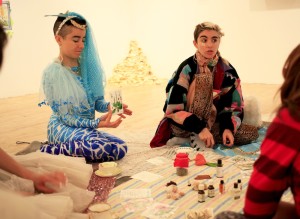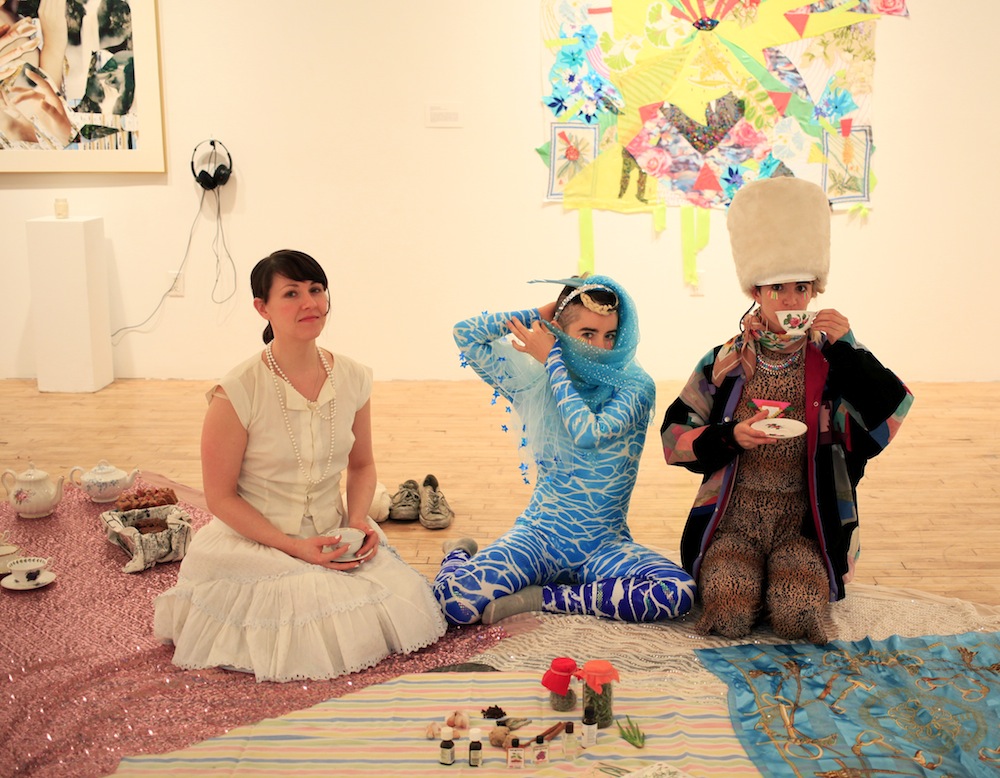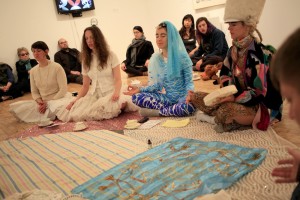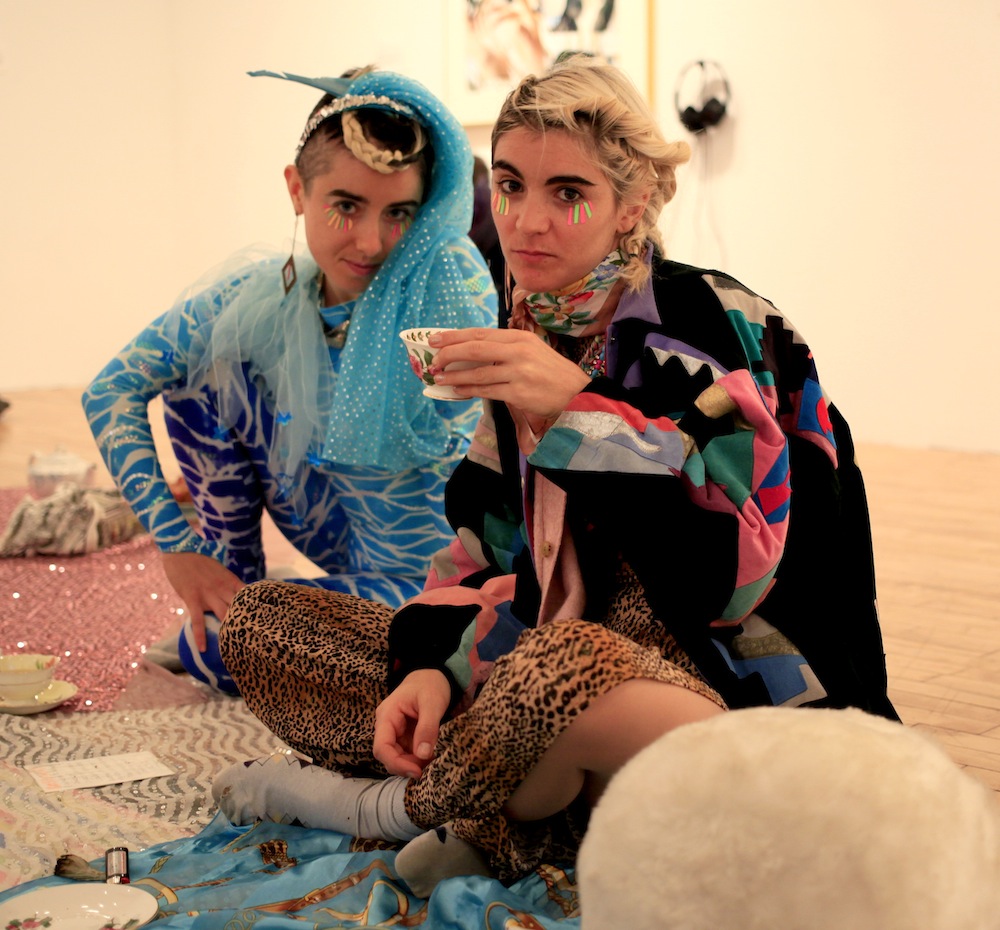Author | Go! Push Pops
Photography by Minomox
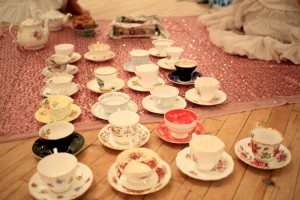 Recently at Momenta Art, as part of the curated show NU AGE HUSTLE (featuring Sanford Biggers, Katie Cercone, Lainie Love Dalby, Vaginal Davis, Elisa Garcia de la Huerta, Greem Jellyfish, Jacolby Satterwhite, Tobaron Waxman and Saya Woolfalk), Go! Push Pops co-hosted an event with the smart women behind A Feminist Tea Party: Caitlin Rueter and Suzanne Stroebe. Like Go! Push Pops, AFTP is a feminist collective that formed in New York City in 2010 out of grad school. Lying somewhere between performance, installation and participatory event, AFTP adopts the tea party as a political vehicle, using dress and installation aesthetics to conduct a site of historical reenactment and discursive feminist space that is progressive, inclusive and playful. Part consciousness-raising, part relational aesthetics, AFTP sets a stage for feminist discourse where one can enjoy sweets and conversation despite your gender, race, sex, political persuasion, or whether or not you even identify as feminist. Says AFTP in their artist statement, “dressed in 1950s costume and greeting guests in our ‘parlour,’ we draw on the iconographic heritage of contemporary representations of women – sex and service, the consumer and the consumed…a set that recasts each space as a home and an open forum where essential and discomfiting issues can be discussed freely and with a sense of humor.”
Recently at Momenta Art, as part of the curated show NU AGE HUSTLE (featuring Sanford Biggers, Katie Cercone, Lainie Love Dalby, Vaginal Davis, Elisa Garcia de la Huerta, Greem Jellyfish, Jacolby Satterwhite, Tobaron Waxman and Saya Woolfalk), Go! Push Pops co-hosted an event with the smart women behind A Feminist Tea Party: Caitlin Rueter and Suzanne Stroebe. Like Go! Push Pops, AFTP is a feminist collective that formed in New York City in 2010 out of grad school. Lying somewhere between performance, installation and participatory event, AFTP adopts the tea party as a political vehicle, using dress and installation aesthetics to conduct a site of historical reenactment and discursive feminist space that is progressive, inclusive and playful. Part consciousness-raising, part relational aesthetics, AFTP sets a stage for feminist discourse where one can enjoy sweets and conversation despite your gender, race, sex, political persuasion, or whether or not you even identify as feminist. Says AFTP in their artist statement, “dressed in 1950s costume and greeting guests in our ‘parlour,’ we draw on the iconographic heritage of contemporary representations of women – sex and service, the consumer and the consumed…a set that recasts each space as a home and an open forum where essential and discomfiting issues can be discussed freely and with a sense of humor.”
For the collaboration at MOMENTA, the Push Pops and A Feminist Tea Party teamed up for a unique event exploring the interstice of feminist politics and spiritual matters. Our event, which we called a “Shak-tea Party” fused the potentiality of the tea party as space of feminist discourse with the yogic notion of Shakti – the female principle of divine cosmic creativity, also known as Kundalini Shakti. Stroebe for one was interested in “the merging of spirituality and feminism” and how we might present an installation that spoke to a contemporary feminism that is “timeless, interdisciplinary, all-inclusive, fluid.”
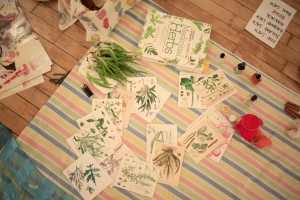 Being a long time fan of AFTP, Go! Push Pops was excited for the opportunity to produce a low-key project with a community vibe and safe, inclusive, grounding atmosphere. We delineated the three-hour event into sections and welcomed visitors with fresh baked breads, homemade herbal teas and a calming, minimal simplicity. AFTP wore white period dresses and pearls with bare feet. Go! Push Pops dressed in multi-colors, painted faces, feathers, somewhere between Priestess, Disney Princess and neophyte Shaman. As Push Pops, we weren’t interested in making a massacre of indigenous cultures or running rampant with the sacred in the name of some derelict trans-ethnic spiritual bricolage. We were interested in developing a relationship to the sacred that was meaningful within a contemporary milieu, that honored the female principle and helped us to be more embodied and grounded on the earth plane. We had turned to outsider traditions like shamanism not for neo-colonial taste-testing but because we believed they offered the best models we had of holistic art forms that could bind the community and beckon the universal soul.
Being a long time fan of AFTP, Go! Push Pops was excited for the opportunity to produce a low-key project with a community vibe and safe, inclusive, grounding atmosphere. We delineated the three-hour event into sections and welcomed visitors with fresh baked breads, homemade herbal teas and a calming, minimal simplicity. AFTP wore white period dresses and pearls with bare feet. Go! Push Pops dressed in multi-colors, painted faces, feathers, somewhere between Priestess, Disney Princess and neophyte Shaman. As Push Pops, we weren’t interested in making a massacre of indigenous cultures or running rampant with the sacred in the name of some derelict trans-ethnic spiritual bricolage. We were interested in developing a relationship to the sacred that was meaningful within a contemporary milieu, that honored the female principle and helped us to be more embodied and grounded on the earth plane. We had turned to outsider traditions like shamanism not for neo-colonial taste-testing but because we believed they offered the best models we had of holistic art forms that could bind the community and beckon the universal soul.
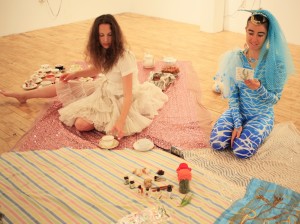 The casual Sunday afternoon event began with a casual discussion about foraging and the use of local herbs for health and well being led by Push Pop co-leader Cristal. Visitors could smell and touch local herbs, ask questions, tell their stories and learn about the unique healing properties of plants from hand-drawn cards strewn on the floor. Following that, Go! Push Pops Diamond led a white tantric meditation for erasing the wounds of love while Cristal kept time with the drum. Diamond explained to participants, “Community and the sound current are the gurus of the Aquarian Age,” and held the lead as we meditated in a circle speaking the words: “True in the Beginning, True in the End, Truth Shall Ever be.” When the meditation had finished, it was time for A Feminist Tea Party to take the stage and move into their portion, beginning with a mindfulness activity based on listening inspired partially by the work of John Cage. Until LIGHTENING STRUCK. We were being taken down by our own team: the feminists!! Generation 2.75 to be exact.
The casual Sunday afternoon event began with a casual discussion about foraging and the use of local herbs for health and well being led by Push Pop co-leader Cristal. Visitors could smell and touch local herbs, ask questions, tell their stories and learn about the unique healing properties of plants from hand-drawn cards strewn on the floor. Following that, Go! Push Pops Diamond led a white tantric meditation for erasing the wounds of love while Cristal kept time with the drum. Diamond explained to participants, “Community and the sound current are the gurus of the Aquarian Age,” and held the lead as we meditated in a circle speaking the words: “True in the Beginning, True in the End, Truth Shall Ever be.” When the meditation had finished, it was time for A Feminist Tea Party to take the stage and move into their portion, beginning with a mindfulness activity based on listening inspired partially by the work of John Cage. Until LIGHTENING STRUCK. We were being taken down by our own team: the feminists!! Generation 2.75 to be exact.
Some feminist artists of a prior generation had come to talk smack. The women who came to the Shak-Tea Party to measure our feminism fell between waves, what Mira Schor refers to as “Generation 2.5” and “Generation 2.75.” Says Schor (who is a mentor to Rueter and Stroebe), “a chronological ditch was created into which fell most of the [feminist] artists born after 1945 but before 1960.” Generations 2.5 and 2.75 were the women who “developed most of the tropes we think of as feminist art.”[i] These were the women that cringed when 3rd wavers came in, seemingly oblivious to the hard work of generations past, eager to have fun again with “unfeminist” imagery and subject matter such as mothers, titts and ass, sometimes even raped and brutalized naked female bodies, sexy female bodies, lipstick and boyfriends – and get attention for it, and be so bold as to still call themselves feminist (or not).
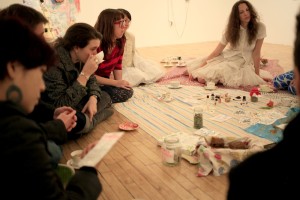 Without going into too much depth, let’s just say suddenly our Shak-tea party was getting slammed, critiqued in a very domineering, confrontational way, right in the middle of game time, right to our faces. Wearing white and dressing in period costume that strategically conjured up images of a “good wife” was offensive, and certainly did not qualify as “rigorous feminist art” to Generation 2.75. AFTP’s exercise with “silence” came off as offensive to some. One guest invoked the Act-Up Slogan “Silence = Death,” in order to critique the mindfulness activity AFTP had used to set the stage for their community discussion. Shit was turnt up. Some people left, some tried to change the subject, some tried to defend what had been criticized, some agreed and others expressed that they were feeling outraged or unsafe. Says Stroebe speaking for AFTP, “Our costumes are meant to speak to a specific moment in feminist history, one that is uncomfortable, one from which we haven’t fully recovered as a society. Above all, everything we do, from the pearls to the serving of tea and sweets, is meant to incite a conversation, and that conversation is the artwork.” Ultimately, much was said, and much was left unsettled. The beauty of Shak-Tea Party was its dialogue, raw and hardly comfortable, hardly controlled. It was very much like Shakti itself, the serpent of consciousness – vibratory, transient and translocal.
Without going into too much depth, let’s just say suddenly our Shak-tea party was getting slammed, critiqued in a very domineering, confrontational way, right in the middle of game time, right to our faces. Wearing white and dressing in period costume that strategically conjured up images of a “good wife” was offensive, and certainly did not qualify as “rigorous feminist art” to Generation 2.75. AFTP’s exercise with “silence” came off as offensive to some. One guest invoked the Act-Up Slogan “Silence = Death,” in order to critique the mindfulness activity AFTP had used to set the stage for their community discussion. Shit was turnt up. Some people left, some tried to change the subject, some tried to defend what had been criticized, some agreed and others expressed that they were feeling outraged or unsafe. Says Stroebe speaking for AFTP, “Our costumes are meant to speak to a specific moment in feminist history, one that is uncomfortable, one from which we haven’t fully recovered as a society. Above all, everything we do, from the pearls to the serving of tea and sweets, is meant to incite a conversation, and that conversation is the artwork.” Ultimately, much was said, and much was left unsettled. The beauty of Shak-Tea Party was its dialogue, raw and hardly comfortable, hardly controlled. It was very much like Shakti itself, the serpent of consciousness – vibratory, transient and translocal.
In terms of AFTP’s aesthetic decisions regarding clothing and dress, Stroebe says, “I fully stand behind our choice in costume, however upsetting this may have been. I resist the notion that women of this era should be left out of the feminist discourse.” In fact, she feels that AFTP is rooted in the fact that, “I came of age in a different era, and my first introduction to feminism was through the riot grrrl movement in the 90s and early 2000s. This was a feminism that celebrated and re-claimed girlhood, and didn’t accept the notion (still alive and well, unfortunately) that to be a “good” feminist, you must not wear short skirts or lipstick, or speak in a girly voice and in plain language. I feel very strongly that I can wear whatever the fuck I want, and no one can tell me that my choices make me or my art less feminist.” Stroebe laments that although the critical voice of Generation 2.75 did its part in igniting a rich dialogue via controversy, she feels their means was harsh and very much “took on the role of the patriarch, completely dominating the conversation.” In effect, their harsh critique of the work, refusing to acknowledge it as Art at all, undermined the true beauty of the piece. It hijacked the feminist community we had brought together toward an agenda of negativity when it could have been one of strategizing, sharing and support. Ultimately, we were still thrilled to have knit together such a powerful, intergenerational group and inspire real dialogue. The Realest.
[i] Mira Schor, “I am not now nor have I ever been…” The Brooklyn Rail, February 6, 2008
http://www.brooklynrail.org/2008/02/artseen/i-am-not-now-nor-have-i-ever-been

